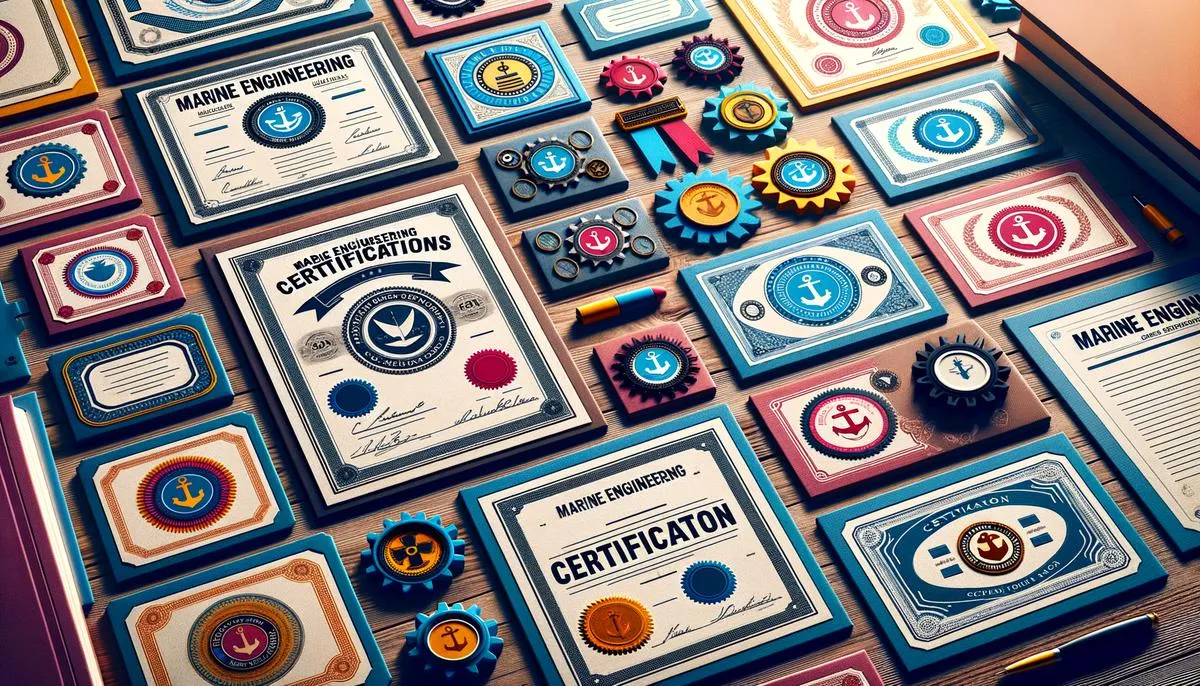
Entering the field of marine engineering involves embarking on a challenging and rewarding journey. This path requires a combination of technical skills, problem-solving abilities, and the capacity to work under pressure. As we explore the educational pathways, certifications, practical experiences, and career prospects that characterize this field, we discover what it takes to succeed in marine engineering.
Education Path
High school students aiming for marine engineering should focus on subjects like mathematics, physics, and English. English and speech classes develop strong communication skills crucial for this career. Shop, computer science, and computer-aided design classes provide a well-rounded background. Foreign language and social studies are also valuable, as marine engineers work globally. In postsecondary education, a bachelor’s degree is the minimum requirement. Common majors include:
- Marine engineering
- Naval architecture
- Ocean engineering Some students enter marine engineering from mechanical or electrical engineering, adding marine engineering concentrations or minors. Choosing an ABET (Accreditation Board for Engineering and Technology) accredited college is important. Graduation from an ABET-accredited school is often required for licensure in many states.1 Coursework ranges from Nuclear Propulsion to Underwater Operations.

Certifications & Licensing
Certifications and licenses are essential for every aspiring marine engineer. The Merchant Mariner Credential (MMC) is a key document, consolidating various endorsements. Obtaining an MMC involves meeting requirements set by the United States Coast Guard, including sea time, examinations, and demonstrating proficiency in safety and environmental protection. The Designated Duty Engineer (DDE) Endorsement comes in different levels based on vessel propulsion power. Engineers earn this endorsement through coursework, sea time, and targeted exams, allowing them to be designated troubleshooters and problem-solvers on board. Engineer Licenses, such as Chief Engineer, First Assistant, Second Assistant, and Third Assistant, are differentiated by vessel tonnage and propulsion power. Each level requires specific exams, sea time, and proficiency proofs. Advancing from Third Assistant to Chief Engineer is a significant career progression. These certifications and licenses signify expertise, dedication, and open doors to exciting opportunities and higher responsibilities. They enable marine engineers to work on a wide range of vessels globally, enhancing career advancement and recognition in the field.
Practical Experience
Practical experience is a crucial component in the career development of marine engineering. It complements education and certifications, enabling engineers to address real-world challenges. Internships offer an introduction to the marine engineering world. Students engage in real projects, learning practical skills beyond textbooks. Co-operative education programs (co-ops) provide deeper immersion, alternating academic learning with practical work. Students apply theoretical knowledge to keep engines running smoothly on vessels. On-job training is essential, transforming novice curiosity into seasoned expertise. It helps engineers adapt their knowledge to specific positions, ships, or projects. Handling equipment malfunctions mid-voyage is best learned through on-job experience. Internships, co-ops, and on-job training create a versatile skill set. They prepare professionals to understand and navigate the complexities of marine engineering. These experiences demonstrate hands-on competence, ensuring engineers are ready to handle the challenges of their profession with confidence. Practical experience is indispensable in marine engineering. It enhances the career journey, creating a path that reflects tales of problem-solving, precision, and mastery.

Career Pathways
As marine engineers complete their education, earn certifications and licenses, and gain practical experience, a wide range of career opportunities becomes available. Entry-level positions, such as Assistant Marine Engineer or Junior Naval Architect, allow engineers to apply theoretical knowledge and practical training. These roles provide hands-on learning under the guidance of experienced professionals, honing skills for advanced engineering positions. Advancement often follows a well-defined path, from Third Assistant Engineer through Second and First, up to Chief Engineer. Each step demands a deep understanding of marine engineering and leadership qualities to guide the crew through challenges. Chief Engineers oversee their vessels, earning professional recognition and respect. Beyond the traditional pathway, management roles and research positions offer additional opportunities. These roles involve leading innovation in design, sustainable practices, and technological advancements. Transitioning to Shipyard Manager, Maritime Operations Director, or head of engineering for marine-tech corporations represents a shift from hands-on engineering to shaping the future of maritime travel and trade. Continuous learning and professional development are essential in the ever-changing maritime world. Conferences, seminars, significant projects, and furthering education are crucial for staying current and advancing knowledge.2 Each marine engineer charts their own course through diverse career opportunities. Whether commanding as Chief Engineer, guiding future generations in leadership, or pushing boundaries in research and development, the key is to move forward with determination, curiosity, and commitment to professional growth. A career in marine engineering is a rewarding journey, offering challenges and opportunities as vast as the sea itself.

Skills & Traits
Technical Savvy: The Sword
Marine engineers must possess a strong foundation of technical knowledge and expertise. From understanding propulsion systems to mastering electrical systems, technical skill is essential. This is developed through curiosity, a desire to learn, and dedication to the craft, from academia to practical application.
Problem-Solving Prowess: The Compass
Engineers navigate challenges through strong problem-solving skills. This comes from experience, intuition, and creativity. It’s the ability to face a malfunctioning engine or a hull breach and find a solution. Developing this skill involves:
- Seeing challenges as opportunities
- Learning from failures
- Keeping creativity alive
Grace Under Fire: The Anchor
Marine engineers must maintain composure in challenging situations. Remaining calm in a crisis is a skill developed through experience. Success is achieved through lessons learned, breathing techniques, and belief in one’s capabilities.
Team Harmony: The Sextant
Marine engineers thrive when they work in harmony with the crew, navigators, and fellow technical experts. Effective communication, respect for each team member’s contribution, and a strong teamwork ethic are essential. Leading and following with equal skill supports both personal and shared goals.
Resilience: The Hull
A marine engineer’s resilience—mental, emotional, physical—forms the foundation of their being. It enables them to recover after setbacks, navigate challenges, and emerge stronger. Cultivating resilience involves:
- Embracing adversity
- Maintaining support
- Believing in the mantra: This too shall pass.

Becoming a skilled marine engineer involves more than acquiring knowledge and credentials. It’s a journey of growth, resilience, and combining technical skills with real-world challenges. Success is found not only in the goals achieved but in the journey itself – a journey of discovery, learning, and overcoming obstacles that shape experienced professionals prepared for the challenges ahead. As the renowned naval architect and engineer William Francis Gibbs once said, The only way to build a ship is to put your heart into it, always. This sentiment reflects the passion and commitment required to excel in the field of marine engineering.